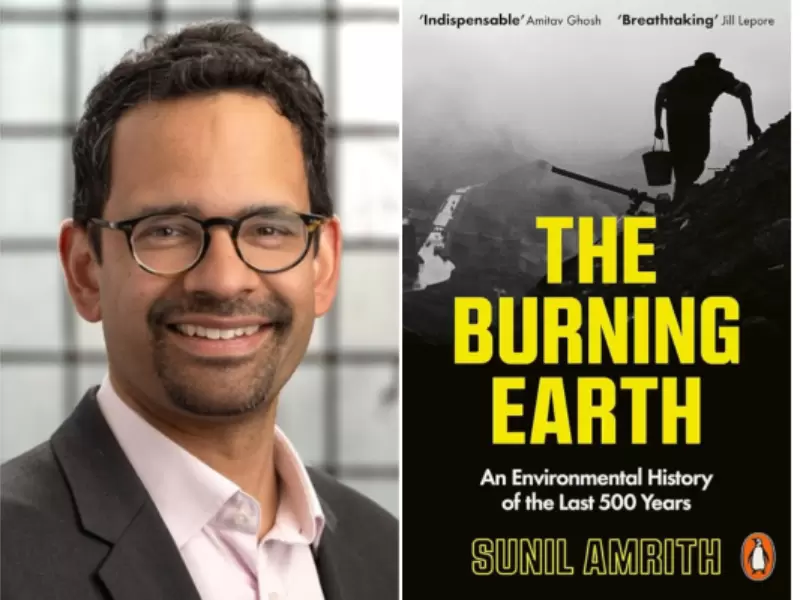Indian American historian wins 2025 British Academy Book Prize
Sunil Amrith, who holds the Renu and Anand Dhawan Professorship of History and teaches in the School of the Environment at Yale University, was named the 13th recipient of the award.
 Sunil Amrith/ Cover of the book 'The Burning Earth' / thebritishacademy.ac.uk/ Amazon
Sunil Amrith/ Cover of the book 'The Burning Earth' / thebritishacademy.ac.uk/ Amazon
Indian-American historian Sunil Amrith was named the winner of the 2025 British Academy Book Prize for his book, The Burning Earth: An Environmental History of the Last 500 Years.
The book, hailed as a landmark in global history, explores how centuries of human ambition, empire, and industry have transformed the Earth—and how those environmental changes have, in turn, shaped human societies.
Also Read: 5 Women Authors Defining the Indian-American Literary Scene
The British Academy Book Prize recognizes outstanding works that advance public understanding of global cultural identity and human experience. Amrith, who holds the Renu and Anand Dhawan Professorship of History and teaches in the School of the Environment at Yale University, was named the 13th recipient of the award.
Announcing the winner, professor Rebecca Earle, chair of the judging panel, described the book as a “magisterial account of the interconnections between human history and environmental transformation.”
The Burning Earth examines the links between empire, industry, environment, and migration across five centuries—from Portuguese silver mining in Peru and British gold extraction in South Africa to oil drilling in Central Asia. It shows how resource exploitation, colonial expansion, and wartime mobilization reshaped landscapes and livelihoods worldwide.
“It is vivid in detail and beautifully written—important reading for anyone seeking to understand the origins of today’s climate crisis,” Earle said. She added that Amrith’s work “exemplifies the spirit of the prize: to deepen understanding of our world.”
The book also highlights how environmental degradation has often driven human migration and how the global pursuit of profit, powered by technology and new energy sources, has transformed the planet.
“There is no issue more pressing, more urgent, and more complicated than the climate crisis,” Amrith said. “I hope that historical perspectives will help us understand how we got to this place—and how we can untangle the knot we find ourselves in.”
Born in Nairobi, Kenya, to Indian parents and raised in Singapore, Amrith studied at the University of Cambridge, where he earned his bachelors of arts and doctorate.
Before joining Yale in 2020, he taught at Birkbeck, University of London, and later at Harvard University, where he was the inaugural Mehra Family Professor of South Asian Studies and co-directed the Joint Center for History and Economics.
At Yale, Amrith also serves as the Henry R. Luce Director of the Whitney and Betty MacMillan Center for International and Area Studies and as vice provost for International Affairs.
His research focuses on the ecological and human connections across South and Southeast Asia and includes work on the history of migration, climate, and empire.
Amrith is the author of five books, including Unruly Waters and Crossing the Bay of Bengal, and has received several major honors, among them the MacArthur Fellowship, the 2024 Fukuoka Academic Prize, the 2025 Toynbee Prize, and the 2022 Dr. A.H. Heineken Prize for History.
Reflecting on the ideas behind The Burning Earth, Amrith said, “War and violence are at the very heart of the environmental crisis. We don’t talk enough about war and peace when we’re thinking about paths through it.”
ADVERTISEMENT
ADVERTISEMENT
E Paper
Video



1749497506.png) Malvika Choudhary
Malvika Choudhary














Comments
Start the conversation
Become a member of New India Abroad to start commenting.
Sign Up Now
Already have an account? Login